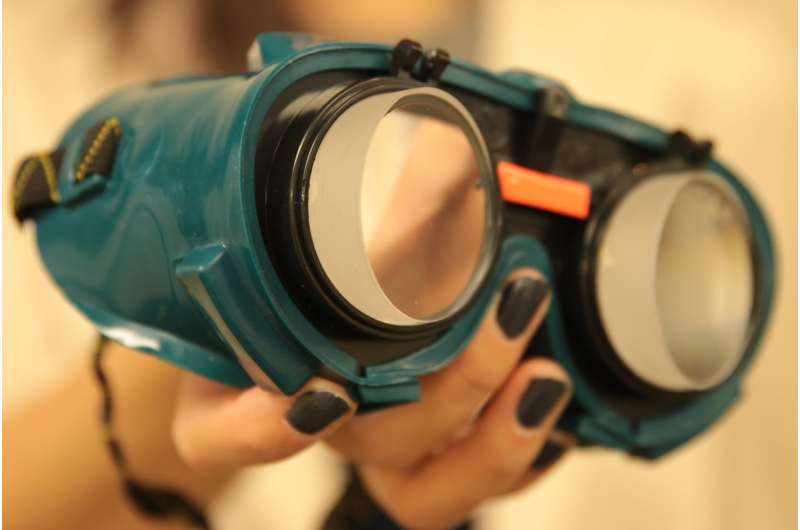Prism goggles are used in to deliver prism adaptation therapy (PAT) to stroke survivors with spatial neglect. The KF-PAT was developed by a team of scientists and clinicians at Kessler Foundation. Credit: Kessler Foundation
Stroke researchers have confirmed that the presence of frontal cortical lesions moderated response to prism adaptation treatment after right-brain stroke. Their findings are detailed in "Frontal lesions predict response to prism adaptation treatment in spatial neglect: A randomised controlled study," which was published online ahead of print on March 20, 2018 by Neuropsychological Rehabilitation. The authors are Kelly M. Goedert, Ph.D., of Seton Hall University, Peii Chen, Ph.D., of Kessler Foundation, Anne L. Foundas, MD, of Tulane University, and A.M. Barrett, MD, director of Stroke Rehabilitation Research at Kessler Foundation.
Spatial neglect is a common cause of functional disability after right hemisphere stroke. Prism adaptation treatment is a promising intervention to promote functional recovery from spatial neglect; however, some individuals fail to respond. The current study randomized individuals with spatial neglect to two groups, treatment and control. The treatment group received ten days of prism adaptation treatment; the control group received standard care.
The researchers confirmed their earlier findings that frontal lesions moderated response to prism treatment. In the treatment group, improvement in spatial neglect symptoms was seen only in individuals with frontal lesions. In the control group, the presence of frontal lesions did not modify response.
"Our research shows that patients with frontal cortical lesions may benefit from prism adaptation treatment for spatial neglect," affirmed Dr. Barrett. "Early identification of patients with hemiparesis and frontal lesions is critical to their optimal recovery," she emphasized, "and could reduce the substantial costs of stroke care and improve public health. Because spatial neglect goes undetected in as many as 80% of stroke survivors, this is a major challenge. Meeting that challenge requires educating stroke professionals about targeted prism treatment, and conducting further research on a larger scale in the stroke population."
More information: Kelly M. Goedert et al, Frontal lesions predict response to prism adaptation treatment in spatial neglect: A randomised controlled study, Neuropsychological Rehabilitation (2018). DOI: 10.1080/09602011.2018.1448287
Provided by Kessler Foundation




















